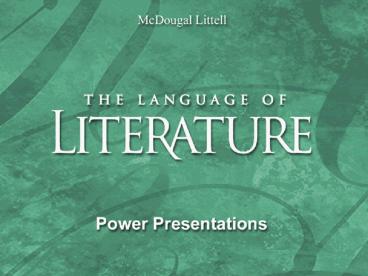Expressing reactions to a literary work . . . - PowerPoint PPT Presentation
1 / 19
Title:
Expressing reactions to a literary work . . .
Description:
... Description Response Quote from Story Theme Description Response Quote from Story Terry sensitive I understand and admire him ... father squirming along the ... – PowerPoint PPT presentation
Number of Views:102
Avg rating:3.0/5.0
Title: Expressing reactions to a literary work . . .
1
(No Transcript)
2
Expressing reactions to a literary work . .
. From Reading to Writing Which pieces of
literature in this unit did you respond to most
strongly? Perhaps you related to the teenage girl
in Checkouts, or to Squeaky in Raymonds Run.
3
Expressing reactions to a literary work . . .
Often in good literature, our emotions are
stirred by certain characters and situations
because they remind us of real things we have
experienced. One way to better understand your
reactions is to write a response to literature.
You can include your thoughts about a story, its
effects on you, and connections to your life.
4
B a s i c s i n a B o x
Response to Literature at a Glance
STANDARDS FOR WRITING
RUBRIC
Introduction
Introduces the title and author and a clear
statement of your response
A successful response to literature should
- include an introduction that identifies the
literary work and clearly states your overall
response to it - tell enough about the literature so that readers
can understand your response - contain clearly described, specific reactions and
responses to the literary work - support your statements with quotations and
details - summarize the response in the conclusion
Conclusion
Summarizes the response
5
Writing Your Response to Literature
We must read not to understand others but to
understand ourselves. E. M. Cioran French
philosopher
6
Writing Your Response to Literature
Make a list of ideas for your personal response
essay.
- Note stories with scenes you can relate to.
- Write down names of characters that have traits
that you admire or dislike.
- Review the stories that make you laugh or cry or
that stay burned into your memory for some other
reason.
7
Planning Your Response to Literature
1. Carefully reread the short story. Read the
selection again, paying attention to what you are
thinking or feeling as you read. What are your
responses to the characters, the events, and the
writers message? Creating a chart can help you
keep track of the information.
8
Planning Your Response to Literature
9
Planning Your Response to Literature
2. Freewrite about your responses. How would you
describe your overall response to the piece? What
life experiences have you had that helped you
connect to the story? 3. Choose a focus. Once
you have done a freewrite, decide which parts of
the story you will include in your response.
10
Planning Your Response to Literature
4. Identify your audience. How familiar is your
audience with the work? What background
information will they need to know in order to
understand your response?
11
Writing Your Response to Literature
You can begin writing even if you have not yet
decided on everything you want to say. As you
draft your response, think about how to organize
your ideas.
- Write an introduction that identifies the title
and author of the work, gives your overall
response, and explains the connections to your
own life.
12
Writing Your Response to Literature
- Begin the body by explaining why you felt as you
did. Elaborate with specific examples from the
literature. This includes quotes and descriptions
of scenes, among other things. Then describe how
these relate to your own life.
- Finish with a conclusion that summarizes your
response.
13
Writing Your Response to Literature
- TARGET SKILL
- A STRONG INTRODUCTION
- The introduction of your personal response must
include the title and author of the work and must
introduce a statement of response. - It should focus on creating a single impression.
Perhaps begin with an image from the story or an
attention-grabbing quote.
14
Writing Your Response to Literature Revising TARG
ET SKILL A STRONG INTRODUCTION Your Intro
should Include a. Important and necessary
info. b. Capturing the readers attention c.
Creating a focused impression
15
Writing Your Response to Literature Revising
Practice You will work in pairs to read each
others Introductions. Answer the following
questions 1. Can the partner who is reading the
intro tell what story is being responded to
and who the author is? 2. Can he or she
state the main idea of the intro? 3. Is he
or she interested in what she is about to
read? (In other words, did the writer grab your
attention?)
16
- Writing Your Response to Literature
- Revising
- TARGET SKILL
- A STRONG INTRODUCTION
- Next, ask your Peer Reader
- How would you sum up my response?
- Which details from the story stick
- out in your mind?
- 3. Did you have enough info to understand
- my response?
17
Writing Your Response to Literature
TARGET SKILL RUN-ON SENTENCES A sentence
expresses a complete thought. A run-on sentence
is two or more sentences written incorrectly as
one for example, Many veterans have bad memories
of the war and this story is about a man who
cannot forget what he saw in Vietnam.
18
Writing Your Response to Literature
Editing and Proofreading
TARGET SKILL RUN-ON SENTENCES Let me introduce
you to your new best friend, Senor
Semi-Colon! How do you use this new friend? When
is it appropriate to use him? How do you avoid
over-using Senor SC?
19
Writing Your Response to Literature
JOURNAL FOR YOUR WRITING SECTION How did writing
about the story add to your understanding of the
literature and the world around you? What did
you learn about the process of writing a personal
response essay?































